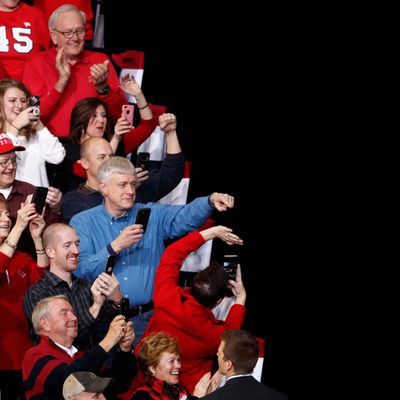
For those of us whose lives (or at least professional careers) revolve around politics, the coronavirus has created a twilight world in which our usual preoccupations only matter if they connect with the life-and-death struggle against this pandemic. For the most 2020-focused people, it’s been life-changing, as Vanity Fair recently noted:
There really is no one for whom the era of social distancing has been a normal experience, but the abrupt shift has been particularly jarring to see unfold within the context of this year’s presidential race — both for the candidates and the journalists assigned to cover them. Traditional campaign events have, at least for the time being, been replaced by livestreamed remarks beamed out of the candidates’ homes. “The campaign trail now runs through Joe Biden’s living room,” said Politico’s Marc Caputo. “That’s where this campaign is being waged now.”
Live events, whether it’s the rallies the president favors so much, or the fundraisers non-wealthy pols like Biden need, or the daily grind of photo ops and speeches that keeps presidential candidates in the news, have all but vanished for an undefined period. And aside from the effect on campaigns themselves, voters are more than a little distracted, and pols need to beware looking insensitive or self-focused at a time when people are dying and fear stalks the land.
The situation for the presidential candidates is obviously complicated. Donald Trump is being forced to abandon (at least some of the time) his accustomed persona as the raging Visigothic champion of one part of America at war with the other, mostly addressing himself to half the country in mocking or defiant tones. The daily coronavirus briefing in which he typically presides must be a strain for him, if only because of his habitual disdain for science. Joe Biden is in the weird position of being the presumptive major-party nominee who is being denied the opportunity to formally claim victory as states delay their primaries; he is also visibly struggling (who wouldn’t?) to figure out an appropriate platform for himself during the battle against COVID-19, in which he has no official role.
Neither party knows whether it will still be able to hold a national convention in anything like the traditional, ritual-laden sense.
Perhaps life will return to the status quo ante sooner rather than later, and the shank end of Campaign 2020 will begin to resemble the presidential contests of the recent past. But it’s possible it won’t, at least fully. And the Washington Post’s Paul Waldman asks a very pertinent question about that contingency: Will we miss it?
[A] campaign without campaigning sounds kind of nice, especially since not much that candidates do on the campaign trail actually shows you how they’ll perform in office. Presidents don’t have to debate the opposition party by taking 90-second turns while standing at a lectern. They don’t have to hold rallies (though they sometimes do, none more than this president), or crisscross a few battleground states while ignoring the rest of the country. They don’t have to have spontaneous heartwarming interactions with average Americans while the cameras click away to show how much they “connect.”
A campaign without campaigning would leave us in the media with much less to talk about, since so much of campaign news is taken up with whatever micro-controversy has gripped the race on a given day. Without all that ephemeral trivia to occupy us, we’d almost have no choice but to consider more substantive issues, things that really affect people’s lives instead of whether someone used the wrong email.
As Waldman acknowledges, there would be lots of non-personal campaigning, notably via paid ads. But political scientists generally believe the impact of paid advertising in presidential races is minimal, assuming one side isn’t running ads unopposed. The bigger question is whether any presidential campaigning matters that much in an era of maximum partisan polarization, in which genuinely independent voters are often low-information voters uninterested in — or hostile to — politics and government:
[T]here’s a truth we don’t often acknowledge: All that time and energy and money campaigns spend is only because a small number of people either aren’t smart enough or don’t care enough to distinguish between two parties and candidates with drastically different ideas about what we as a country should do next.
If you’re reading this, you’re not among them, and the campaign couldn’t possibly affect you. No ominous 30-second ad, no inspiring speech, no candidate gaffe, no clever stratagem will switch your vote from Republican to Democrat or vice versa. You already know who you’re going to vote for in November, and your mind isn’t going to be changed.
From that perspective, if the coronavirus is still overshadowing politics this fall, the presidential campaigns (down-ballot campaigns are in a different situation, since many of those candidates have to make themselves known in order to draw a reliable vote even from their own party) will have to decide whether to spend unprecedented amounts of money to get through to “swing voters” who will probably be less likely to vote than ever before.
If the virus is still raging, however, and even normally motivated partisan voters are reluctant to cast ballots (at least in states where voting by mail isn’t easy), you could see campaigns go a bit wild in trying to “motivate the base,” which is Trump’s bread-and-butter, but is also a go-to strategy for Mr. Electability Joe Biden. How the candidates square that with the kind of tone appropriate for a national emergency is a tough question — as is their quandary if by October nobody much cares.






























